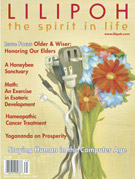Older and Wiser
 Issue: Spring 2007, Staying Human in the Computer Age; Issue #47
Issue: Spring 2007, Staying Human in the Computer Age; Issue #47
The Blessings of Our Elders
Radio host Glenn Brooks invited LILIPOH editor Christy Korrow to be a guest on his show, along with Native American healer and naturopath Phillip Cloudpiler. What follows is excerpted from one of their on-air conversations. Broadcast on KRXA in Monterey, California on Saturdays at 11 a.m. PST, the show streams live on the internet. Visit www.vibrantlivinginc.com for details.
LILIPOH: What is the role of the elders in the Native American community and how can our current culture learn from that?
Cloudpiler: We know that first of all, on a physical level, as a person gets older, they require more attention from their immediate community. In the old ways, we didn’t shuffle them off and stick them in a home somewhere. If they required more attention, we saw that as a blessing––for our children. Now how often do you find that? We had an exquisite experience in my family. My wife’s grandmother got up into her nineties, and she was very frail, with osteoporosis and Parkinson’s, and she needed help. No one else in the family was in a position to do anything, and frankly, neither were we for that matter. We were very poor. But, we took her in, and we took her in gratefully, acknowledging her wonderful sense of humor, her sharpness of mind, and her wisdom. If you look at somebody who is 92 years old, and the changes that they have seen, just in our culture and in our environment, you realize how much they have to teach. But it’s one thing to give lip service to that, it was another thing entirely for our family to have the opportunity to bring her in and care for her. My children were so incredibly blessed and I cannot think of any other venue for them to receive that kind of a blessing, except by bringing in our elder, our eldest member of our family, and gratefully, thankfully taking care of her.
Again, we don’t have that in our society, in our culture. It’s absent, it’s gone. We provide facilities for them to be cared for by someone else.
To remain connected to our elders provides a sense of bringing the hearts of the fathers to the children, and the hearts of the children to the fathers. It creates the hoop in the first place, and completes the hoop in the last place.
We need this experience of caring for our elders, we need their wisdom. Not only that, we need our children to have the opportunity to interact on that level as healers. Because, with an elderly person, you don’t have to be a doctor, or any kind of technician, or practitioner, or clinician to be a healer. Everything you do with an elderly person is making you a healer. And everything they do or say when there are young people to listen––and that’s key, when there are young people to listen––everything they say is a marvelous teaching moment. Most youth, young adults, adults, never get an opportunity, possibly in their entire lives, to have an experience like that. So you are taking away something that is so important to the old ways. And, it is also, incidentally, the one area that is most easily instantly felt, when you come in connection with Native Americans who have lost that. There is a gaping hole in their lives when they don’t have their elderly with them. When we go into the sweat lodge the first thing we say is “all my relations”–– and then one of the first things we pray for is the health and well-being of our elders, all over the world. It doesn’t even matter if we are related to them, we want them to be well, we want them to be safe. And because, so often, they are not in a position to be making life decisions for themselves, we pray that those who are making the decisions are able to do it with the spirit, and with the good of our elders in mind.
We never forget that. I think it’s an important part of rebuilding a connection to community. As Native Americans, we also think of our planet as the first of our elders. And, so, our elderly people, our elders in our bands, in our tribes, in our churches, they really are the example of, or they are the representatives of our earth Mother, the first of our elders. It’s an incredibly important thing on all levels of healing.
I remember one of my mentors, I had no idea how old he was. He had to be 300 years old to look at him. He was OLD. He was decrepit, they helped him around, he was brittle and frail. And yet, he walked me up a mountainside and it took us all day long to get to the top, and then he kept me awake by beating me with a stick all night long, because I was the keeper of the fire. Before we did that, we had done a sweat lodge. Then we walked down the mountain and he did another sweat lodge with me.
He had to have been well into his nineties. How does somebody well into his nineties have the stamina to do that? I could hardly do that, and I was 19 years old. I asked him, “How is it you can be so darn old and do all this stuff?”
He laughed at me, and he said, “Here is the key. Learn to do one new thing every day of your life. If you will learn to do one new thing, then nothing gets old.”
I have kept that in my heart and, as my bones start creaking, I remember that. I try to do something new every single day.
